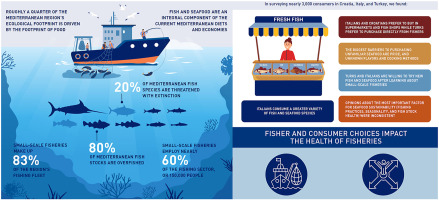Author links open overlay panelSelen Altiok a, Adeline Murthy a, Katsunori Iha a, Alessandro Galli bShow morehttps://doi.org/10.1016/j.ocecoaman.2021.105915Get rights and contentHighlights•
Seafood consumer habits in three Mediterranean countries are assessed
•
Human pressures on Earth ecosystems due to seafood preferences are quantified
•
A shift in consumer attitudes is possible upon gaining new information
•
Consumers in Italy and Turkey more likely to change behaviour than in Croatia
•
Increasing SSF market penetration requires improved communication on SSF sustainability
Abstract
Seafood is central to the diet of Mediterranean inhabitants. However, there is high consumer demand for certain species whose populations are rapidly declining in the Mediterranean Sea. Diversifying regional seafood preferences has the potential to reduce pressure on marine ecosystems while supporting local fishing economies. Here, we explored this opportunity through case studies in three Mediterranean countries: Croatia, Italy, and Turkey. First, we conducted an Ecological Footprint Analysis (EFA) to quantify the environmental impact of each country’s food consumption choices. Then, we distributed a seafood consumer survey to understand each country’s dietary preferences and residents’ overall willingness to change their diets, with a specific focus on products from Small-Scale Fisheries (SSF). We found food consumption to be the primary Ecological Footprint driver in all three countries, with a contribution from the consumption of fish and seafood ranging from 6% (Turkey) to 11% (Italy) of each country’s food Footprint. Results from the consumer survey showed that dietary preferences were unique to each culture. For example, consumers in Italy and Turkey were more willing to modify their diets than residents surveyed in Croatia. Across all three countries, consumers who are more aware of product labels, origin, and freshness of seafood products were more willing to purchase diverse seafood products. To diversify seafood consumption choices, particularly away from high trophic level species, consumer awareness campaigns should be tailored to meet the preferences of each unique culture in the Mediterranean. A broader Pan-Mediterranean study of culturally-unique consumer attitudes is warranted to accelerate progress towards sustainable seafood consumption in the region that benefits both biodiversity and local fishing economies.
Keywords
Food consumption survey
Dietary habits
Consumer preferences
Seafood consumption
Sustainable consumption
Recommended articles
© 2021 The Authors. Published by Elsevier Ltd.

